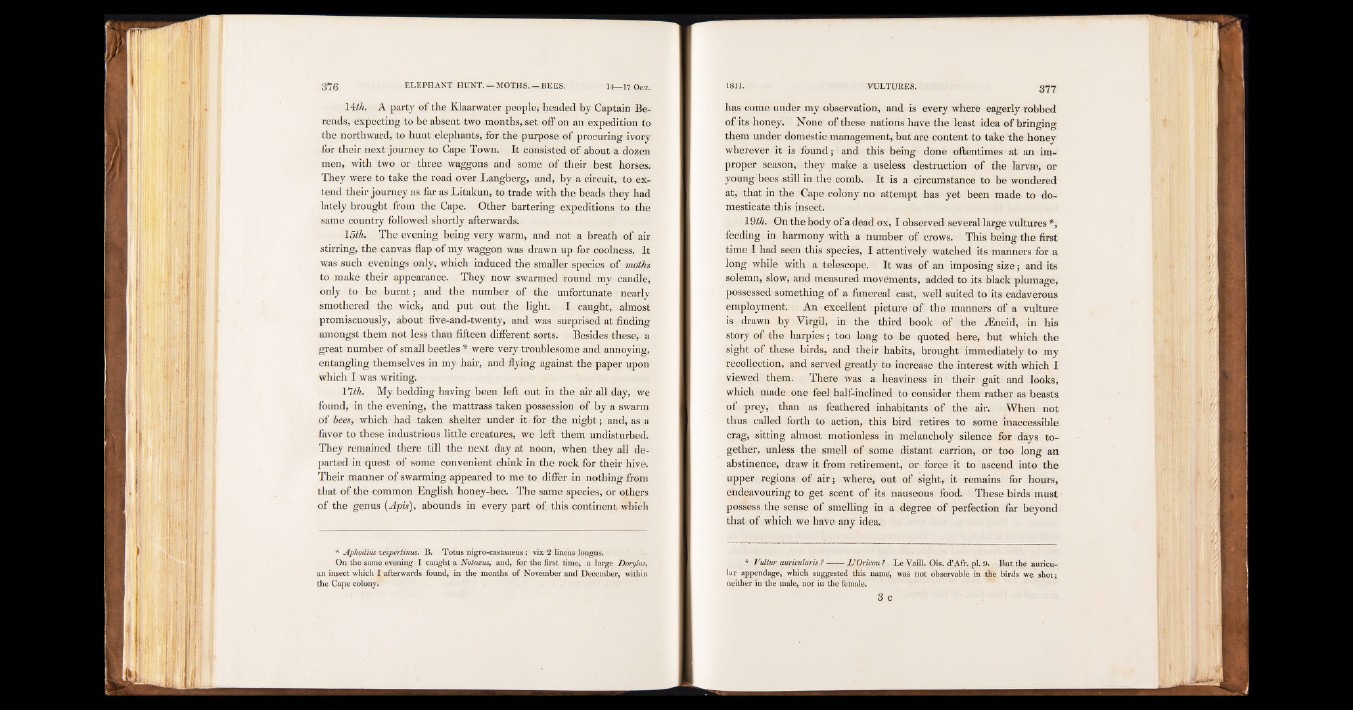
14th. A party of the Klaarwater people* headed by Captain Be-
rends, expecting to be absent two months, set off on an expedition to
the northward, to hunt elephants, for the purpose of procuring ivory
for their next journey to Cape Town. It consisted of about a dozen
men, with two or three waggons and some of their best horses.
They were to take the road over Langberg, and, by a circuit, to extend
their journey as far as Litakun, to trade with the beads they had
lately brought from the Cape. Other bartering expeditions to the
same country followed shortly afterwards.
15th. The evening being very warm, and not a breath of air
stirring, the canvas flap of my waggon was drawn up for coolness. It
Was such evenings only, which induced the smaller species of moths
to make their appearance. They now swarmed round my candle,
only to be burnt; and the number, of the unfortunate nearly
smothered the wick, and put out the light. I caught, almost
promiscuously, about five-and-twenty, and was surprised at finding
amongst them not less than fifteen different sorts. Besides these, a
great number of small beetles * were very troublesome and annoying,
entangling themselves in my hair, and flying against the paper upon
which I was writing.
11th. My bedding having been left out in the air all day, we
found, in the evening, the mattrass taken possession of by a swarm
of bees, which had taken shelter under it for the nigln.; and, as a
favor to these industrious little creatures, we left them undisturbed.
They remained there till the next day at noon, when they all departed
in quest of some convenient chink in the rock for their hive.
Their manner of swarming appeared to me to differ in nothing from
that of the common English honey-bee. The same species, or others
of the genus {Apis), abounds in every part of. this continent which
* Aphpdius vespertinus. B. Totus nigro-castaneus; vix 2 lineas longus.
On the same evening I caught a Notoxus, and, for the first time, a large Darylus,
an insect which I afterwards found, in the months of November and December, within
the Cape colony.
has come under my observation, and is every where eagerly robbed
of its honey. None of these nations have the least idea of bringing
them under domestic management, but are content to take the honey
wherever it is found; and this being done oftentimes at an improper
season, they make a useless destruction of the larvae, or
young bees still in the comb. It is a circumstance to be wondered
at, that in the Cape colony no attempt has yet been made to domesticate
this insect.
19th. On the body of a dead ox, I observed several large vultures *,
feeding in harmony with a number of crows. This being the first
time I had seen this species, I attentively watched its manners for a
long while with a telescope. It was of an imposing size; and its
solemn, slow, and measured movements, added to its black plumage,
possessed something of a funereal cast, well suited to its cadaverous
employment. An excellent picture of the manners of a vulture
is drawn by Virgil, in the third book of the iEneid, in his
story of the harpies; too long to be quoted here, but which the
sight of these birds, and their habits, brought immediately to my
recollection, and served greatly to increase the interest with which I
viewed them. There was a heaviness in their gait and . looks,
which made one feel half-inclined to consider them rather as beasts
of prey, than as feathered inhabitants of the air. When not
thus called forth to action, this bird retires to some inaccessible
crag, sitting almost motionless in melancholy silence for days together,
unless the smell of some distant carrion, or too long an
abstinence, draw it from retirement, or force it to ascend into the
upper regions of air; where, out of sight, it remains for hours,
endeavouring to get scent of its nauseous food. These birds must
possess the sense of smelling in a degree of perfection far beyond
that of which we have any idea.
* Vultur auricularis ? UOricou ? Le Vaill. Ois. d’Afr. pi. 9. But the auricular
appendage, which suggested this name, was not observable in the birds we shot;
neither in the male, nor in the female.